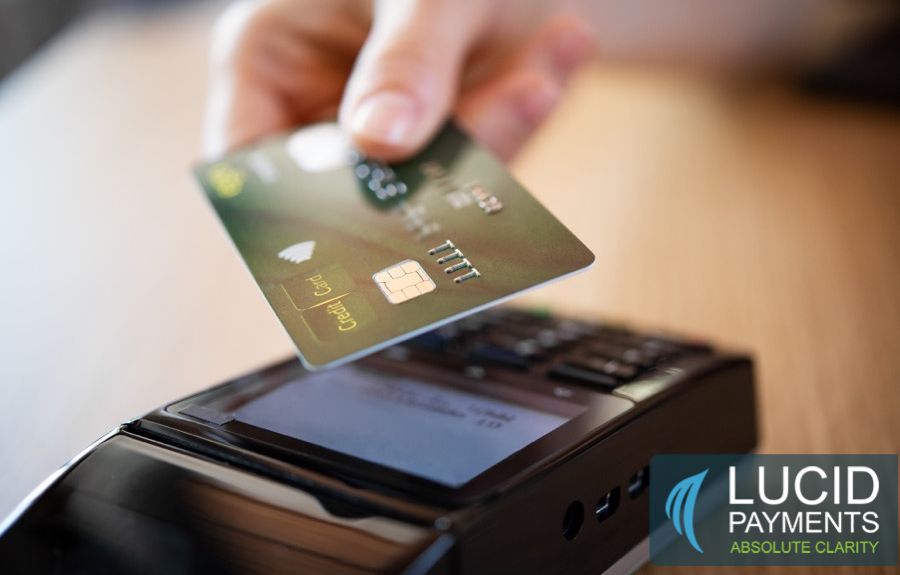 Let’s face it – most business owners don’t know the first thing about payment processing.
Let’s face it – most business owners don’t know the first thing about payment processing.
When they get their statement at the end of the month, many of them have no idea what they’re paying for, but they want to be able to accept payments with credit cards, so they just pay it and move on.
And when they’re shopping for a payment processor, many business owners don’t have a clue what to look for, so typically, they’ll just pick one at random and forget about it.
Unfortunately, all this uncertainty breeds a lot of myths and misconceptions, which can end up muddying the waters even more.
But here at Lucid Payments, we’re on a mission to provide absolute clarity for our customers and do what’s in the best interests of business owners, so we thought it was about time we exposed some of these myths for the loads of rubbish they are.
So, if you want to learn more about some of payment processing’s biggest myths, and gain a greater understanding of this industry, then you should definitely keep reading.
Because in this article, we’re going to expose two of the biggest myths about payment processing, so business owners like you can have greater clarity and make better decisions.
The Biggest Myths About Payment Processing
If we wanted to expose all the myths about payment processing, this article would take you all day to read, so for the purposes of this post, we’re going to focus on the two myths about payment processing that we feel are having the worst impact on business owners.
It’s unclear where these myths came from, but we know one thing for certain – their existence is making it much more difficult for merchants to choose the payment processor that’s best for them.
With that in mind, let’s expose these myths for what they are, and try to put them to rest for good.
Myth #1: The Big Banks Have the Most Secure Payment Processing

When we think about a bank, many of us imagine a place full of impenetrable vaults and heavily armed guards, and this gives us the idea that they provide better security.
But when it comes to payment processing, this just isn’t the case.
First of all, it’s important to point out, as we’ve seen in recent years, that the big banks are just as susceptible to data breaches as anyone else.
For example, back in 2014, JPMorgan Chase was hacked, compromising the information of more than 80 million customers.
Then, in 2017, Bank of Montreal, which is easily one of Canada’s biggest banks, experienced the theft of 113,000 customers’ information.
And in March of 2019, Capital One was hit by a massive data breach, which affected about 100 million Americans, and more than 6 million Canadian customers, who all had their information stolen by a hacker, via credit card applications.
These are just a few examples of these kinds of incidents, so as you can see, the big banks are not the impenetrable fortresses we like to think they are.
If anything, they’re more likely to get hacked than the smaller providers, as they have way more customers, and are therefore much more enticing to hackers.
At the same time, credit card companies like Visa and Mastercard have very specific and stringent rules that payment processing providers are expected to follow.
And it doesn’t matter if the provider is a multi-billion-dollar bank or a smaller family-owned business like ours, these rules still apply, and anyone who doesn’t follow them is subject to some pretty serious consequences, up to and including being banned from this industry.
If you take a look at Visa’s rules, for instance, it’s obvious that these credit card companies do not play around with this sort of thing.
These guidelines, which are composed of nearly 900 pages, detail the rules payment processors must follow on everything from how they communicate with customers and word their contracts to the platforms they use, how their terminals run, and of course, their security measures.
On page 68, it states that Visa reserves the right to “Investigate, review, audit, or inspect” any payment processor “to ensure that it is complying with the Visa Charter Documents, Visa Rules, and applicable brand and security standards and procedures, and operating in a safe and sound manner.”
Page 61 offers an example of the kind of penalties payment processors are subject to if they don’t follow Visa’s rules.
Referring to Canadian payment processors who fail to prove to Visa that they’re complying with the federal government’s Code of Conduct for the Credit and Debit Card Industry in Canada, it states that those who fail to “provide Visa with information required due to the review will be subject to a non-compliance assessment of CAD 100,000 per month”.
That being said, every provider of payment processing is subject to these same rules, and incredibly harsh penalties for not following them, and therefore the security standards of those operating in this industry are essentially the same across the board.
Couple this with the fact that the big banks are a much bigger target for data theft, and the idea that they can offer better security than smaller providers is nothing short of absurd.
Myth #2: The Big Banks Have the Lowest Credit Card Processing Fees

Banks profit into the billions every year, and it’s not because they give good deals, so the idea that they’ll offer a lower price on your payment processing is laughable.
First of all, like many large corporations, banks are basically guaranteed a steady stream of customers, as everyone needs the services they provide.
This means they don’t have to be as competitive as smaller companies, and if we’re being honest, the way they operate shows that they really don’t value their customers.
On top of all that, the big banks typically have thousands of employees, which means they have massive overhead, and this does not put them in a position to be offering lower prices.
Moreover, their foremost responsibility is to their shareholders, and more often than not, they’re only interested in getting a bigger return on their investments.
Compare this state of affairs to that of a privately-owned payment processor, like Lucid Payments, which isn’t guaranteed customers, doesn’t have any shareholders, and whose main responsibility is to their customers, and it’s pretty obvious who’s in a position to give you a better deal.
With that in mind, it’s time to drop this nonsensical belief that a big bank is going to provide cheaper payment processing because this is just simply not true.
The bottom line is these big banks tend to put profit before people and see their customers as nothing but numbers.
But here at Lucid Payments, our customers aren’t just numbers to us, and we believe in doing what’s in the best interests of business owners, so we have to put people before profit.
We don’t believe in treating every customer with the same old cookie-cutter approach, and we pride ourselves on offering personalized services and taking everything on a case-by-case basis.
So, instead of choosing a big bank that couldn’t care less about you or your business, why not help to create competition in the payment processing industry by supporting a small business that actually cares about its customers and will work to give you a better deal?
Want to find out how we can help you save money on your payment processing? We go above and beyond to ensure you get the best possible price. Give us a call today to learn more about what we can do for you.